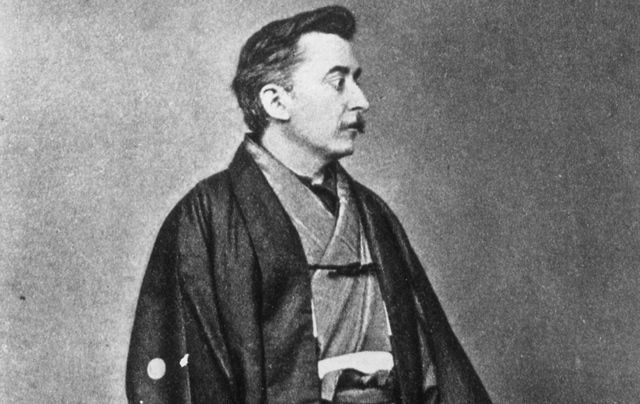So ahead of his time that we are still learning to become his contemporaries, Irish writer (Patrick) Lafcadio Hearn (1850-1904) carried a groundbreaking dual heritage.
Born in Greece to an Irish father, Hearn was raised in Dublin in the mid-19th century, where his Greek-Irish upbringing lent him a unique appreciation of our twin mythologies - and in particular of our tales of the supernatural and the unknown – later resonated strongly with his appreciation of Japanese folklore.
If folklore is an expression of the interior lives of a people, then Hearn's temperament and his unique Irish-Greek background acted like a spiritual master key that unlocked them all.
As famous in his own time as writers like Mark Twain and Edgar Allen Poe (he first came to prominence as a writer and journalist whilst living in America), we have been far slow to add him to the pantheon of great Irish writers, possibly because of his unusual intercultural background and international career.
But in an era where the achievements and contributions of the Irish Diaspora are being appreciated like never before, now seems to be the right time to do what the Japanese have done already – award him pride of place in our Irish literary canon.
Right now Greece may be further along in this endeavor, however. President of the Greek National Tourism Organization Angela Gerekou is in no doubt of Hearn's stature or legacy.
“Every child in Japan has read Hearn's collection of Japanese folk tales," she tells IrishCentral. "He was very progressive in his life and in his work. In America, he married a mixed-race woman in the 19th century when it was almost unheard of and years later he took up Japanese citizenship (changing his name to Koizumi Yakumo) and taking a Japanese wife.”
“For me, to make it clear, I am devoted to promoting to life and achievements here in Greece, but then to connect his Greek heritage to other countries, especially Japan and Ireland. Because as we know he had an international kind of spirit, a global kind of spirit.”

President of the Greek National Tourism Organization Angela Gerekou
Almost inevitably Hearn corresponded with Ireland's Nobel Prize-winning poet W.B. Yeats. Dedicating himself to gathering the folktales and ghost stories of Japan in much the same way Yeats did in Ireland, Hearn arguably wrote the most famous book about them, titled “Kwaidan: Stories and Studies of Strange Things.”
“Though his work we see an opportunity for Greece,” Gerekou explains. “You know, his background connects Greece, Ireland and Japan in a way that speaks to our cultures and our tourism,” Gerekou adds.
“Having lost his mother early in life – and that's a massive loss – he spent his career finding ways to connect to people and cultures. It was a drive that I think was inspired by loss of that original first connection. He found personal restoration for his own loss by making the connections that others missed. We all benefit from him.”
Those connections could act as a bridge to a shared Irish, Greek and Japanese cultural event to mark his achievements, Gerekou suggests. “Maybe we could share an event, make an international event based on his achievements, between Ireland, Japan and Greece, based on the blossoming of his own life and art. It also ties into the larger Greek tourism ambition of sustainability, which is an ambition I know we all share.”
There are intriguing similarities between our folkloric histories and our outlooks, Gerekou adds. “We were so similar in some ways, the Irish and the Greeks. There is this joy of life in your songs and dances. You have a spirit that is similar to ours.”
“We can build a bridge through Hearn, through his life and work. He has lived such a modern life and his spirit connects us globally. He is the original cultural ambassador. Any time I can speak about him I will,” Gerekou adds.

"Travel is fatal to prejudice," wrote Mark Twain and Hearn embodies this idea. For a man of his time, he was unusually open to experience. His gaze could be completely free of prejudice.
His writing shows that he could walk into a place - or a nation - and simply look at it until it revealed itself. But being a man of the 19th century, he could sometimes fall into lazy stereotypes too. In the main, however, he didn't project what he thought a place or a people should be. Instead, he was content to let them all emerge in their own way and time. And that's what draws people to his writings still.
“I'm fascinated by his modern sensibility,” says Gerkou. “I'm fascinated with the impact that he had in a place completely alien to him in Japan. He bridged those cultures and he was himself a bridge."
She concludes: "His book “Kwaidan” was instrumental in introducing the West to Japanese culture. We need to find more ways to honor that. It's time.”




Comments